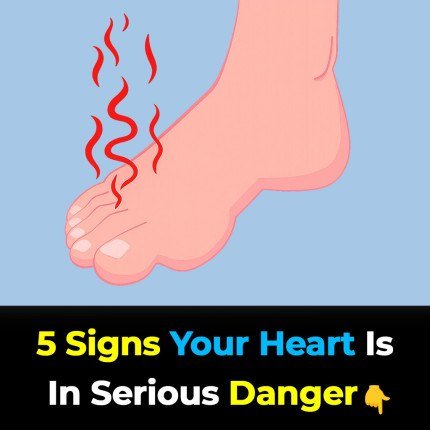Here are 5 signs that your heart might be in serious danger. Recognizing these symptoms early can be crucial for preventing severe heart problems or even saving your life.
1. Chest Pain or Discomfort (Angina)
-
Description: This is the most classic sign of heart trouble. It usually feels like pressure, squeezing, fullness, or pain in the center or left side of the chest.
-
Details: The pain can last a few minutes or come and go. It might spread to the arms, neck, jaw, back, or stomach. It often happens during physical activity or stress and improves with rest.
-
Why it’s serious: Chest pain may indicate reduced blood flow to the heart muscle (ischemia), which could lead to a heart attack.
2. Shortness of Breath
-
Description: Difficulty breathing or feeling like you can’t get enough air.
-
Details: This can occur with or without chest pain. It may happen during exertion, at rest, or even when lying flat.
-
Why it’s serious: It suggests that the heart isn’t pumping effectively, causing fluid buildup in the lungs (heart failure) or poor oxygen delivery to the body.
3. Irregular Heartbeat (Arrhythmia)
-
Description: Feeling your heart racing, fluttering, pounding, or skipping beats.
-
Details: You might notice sudden episodes of rapid heartbeat (tachycardia) or slow heartbeat (bradycardia). Sometimes it causes dizziness or fainting.
-
Why it’s serious: Arrhythmias can reduce the heart’s ability to pump blood efficiently and may lead to stroke or sudden cardiac arrest.
4. Swelling in Legs, Ankles, or Abdomen (Edema)
-
Description: Noticeable swelling, especially after standing for a long time.
-
Details: This occurs because the heart isn’t pumping blood effectively, causing fluid to accumulate in tissues.
-
Why it’s serious: It is a common symptom of heart failure, indicating that the heart muscle is weakened or damaged.
5. Unexplained Fatigue or Weakness
-
Description: Feeling extremely tired, weak, or unable to perform usual activities.
-
Details: This is often due to reduced blood flow and oxygen delivery to muscles and organs.
-
Why it’s serious: It can be an early warning sign of heart disease, especially in women, who may not experience typical chest pain.
When to Seek Immediate Help
If you experience severe chest pain, sudden shortness of breath, fainting, or sudden weakness—call emergency services immediately. Early intervention can be lifesaving.
